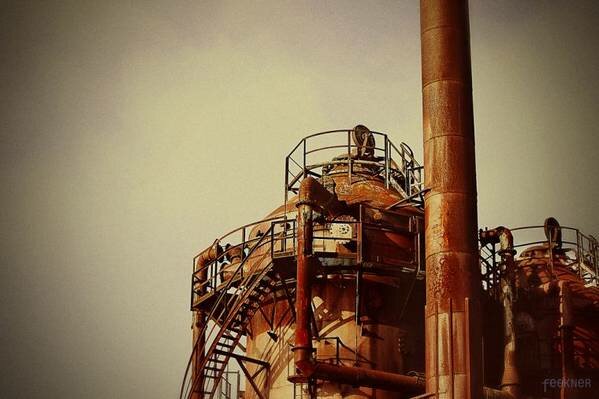A joyful "Gum Wall" courtesy of SunBreak Flickr pool member lwestcoat
Governor Gregoire has come up with a few ways to raise an easy $605 million: sin taxes. The Olympian says she'd put "new levies on toxic materials that include refined oil, and on bottled-water, carbonated beverages, cigarettes, candy, and gum."
I suppose the tax on toxics like oil qualifies as a sin tax. (We're getting very moral about the environment these days.) In any event, it brings in the most money, about $215 million, mostly from Washington refineries. Putting a sales tax on candy and gum, the Seattle Times says, brings in just $28 million.
You'd think $600 million added up to real money, but the state has a $2.8 billion deficit forecast for 2010 and 2011. Gov. Gregoire is hoping to talk the federal government out of over $400 million, but that still leaves quite a shortfall.
 The rusting husk of Gasworks Park, a fitting metaphor for our elected government. Photo by our Flickr pool contributor feekner.
The rusting husk of Gasworks Park, a fitting metaphor for our elected government. Photo by our Flickr pool contributor feekner.
Late last month, I wrote about Oregon's special vote for Measures 66 and 67, two bills passed by the legislature and signed by the governor that were sent to the voters as a referendum, which raised taxes to help close a budget shortfall. One raised the minimum corporate tax for the first time since 1931, while the other was a modest increase in the income tax for high-earners (Oregon has an income tax but no sales tax). Both measures passed with substantial margins, with roughly 54 percent in favor to 46 percent opposed.
The vote was closely watched nationally because Oregon, like Washington, is a state known for its anti-tax fervor. Oregon had its own Tim Eyman, has caps on property tax increases, and has repeatedly rejected new tax increases. But faced with dramatic cuts to crucial services, Oregon voters banded together with their elected representatives and passed two very simple measures that kept the state working.
Our fearless leaders in Olympia, on the other hand, have done virtually nothing. While Gregoire has stated she wants to "buy back" some of the slash-and-burn budget cuts she originally proposed (as a matter of state law, which requires her to present a balanced budget--from the beginning, she made clear she did not support that budget), her alternate budget still relies extensively on cuts, with a large portion of new revenue expected from federal stimulus money. The House has introduced a bill (HB 3176) that would generate $210 million in new tax revenues by mostly closing loopholes, but that's a pittance compared to the overall $2.6 billion shortfall over the biennium....
The Coalition for a Sustainable 520--with representatives of the Sierra Club and Cascade Bicycle Club, House Speaker Frank Chopp, Sen. Ed Murray, Rep. Jamie Pedersen, Councilmembers Mike O’Brien and Nick Licata, Mayor Mike McGinn--met this morning [Seattle Channel video] on a populist impulse that is not immediately clear, given that they told Publicola there's little hope of their gathering being heeded in Olympia.
Their primary request is that two of the six lanes be reserved for transit, preferably light rail. In the A+ design for 520's replacement, two lanes are reserved as HOV. Montlake doesn't want more cars, and in fact the group has a poll (who doesn't, though, really?) showing 69 percent of Seattle supports light rail on 520. (Seattle Transit Blog has a roundup of who wants what.)
They already have evidence of pushback, though, in a response from Gov. Chris Gregoire, says the Seattlepi.com. Her letter back to the City Council [pdf], who meekly asked for time to make design adjustments, brooks no hesitation:
Changing the configuration now would require a new environmental process. The office of the Attorney General tells us that revisiting these decisions from several years ago would set the project back at least 18 to 24 months. Our commitment to ensuring public safety does not allow that kind of delay....
(more)

Most Recent Comments